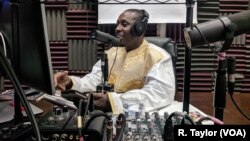Every Wednesday night, Boubacar Ba goes to a radio production studio in New York City and prepares for his show.
The program, called Radio Mali USA, is a show by Malians for Malians around the world.
With a tall glass of water and a few news stories in hand, Ba readies for whatever may happen in his open-ended conversations with listeners. It is a few minutes after the normal start time, and he has yet to say a word. But there are already a hundred or more listeners waiting to speak with him.
“My show, sometimes it goes to three hours, because the cab drivers, they don’t want it to end.”
His radio station broadcasts in Fulani and Bambara, two languages of Mali.
In the United States, many immigrants speak in languages that are rarely spoken across the country. So, staying connected to local news and culture can be hard. In many immigrant communities, call-to-listen radio programs are designed to fill this need. You call a local telephone number or use a mobile phone app to hear the programs.
Such programs offer a brief escape from day-to-day struggles facing immigrants, including the ones without legal documents.
Ba is one 7,000 world broadcasters allied with Zeno Media. The company offers diaspora populations the chance to connect to news from their home countries in their home languages. The company says it has listeners in over 150 countries.
‘I would be lonely’
Baruch Herzfeld is the founder and president of Zeno Media. He says its programs are designed for immigrants whose jobs require them to spend a lot of time alone.
“If I was a security guard in a building, and I didn’t have that much human interaction, I was thinking, ‘What can I provide to this person to entertain them or to make their day better?’ I thought to myself, ‘If I was doing this, I would be very, very lonely.’”
Without the issue of limited phone data plans, Herzfeld says the company provides listeners with more hometown news. And, he says, the program format leads to honest conversation.
Zeno Media says an average program lasts about 90 minutes. It claims that all the shows produced in 2017 added up to 10.5 billion minutes of programming.
“Their world exists in a geography that’s 3,000 miles from where they’re from,” Herzfeld said about listeners. “We try and build technology that decreases the limits that geography previously put on staying connected.”
A form of relief
Boubacar Ba became a political news broadcaster in 2009. He says news of Mali is most important for his listeners. Second are U.S. immigration issues.
After President Donald Trump ordered immigration policies like the travel ban, Ba says, there has been a sharp increase in interest in the subject. He says the interest has grown the most among undocumented listeners. Sometimes, he brings in lawyers or other specialists, and also offers his own advice.
“Mainly, try to stay underground. That’s the main advice we tell those who don’t have papers. Don’t expose yourself too much.”
Ba also tells them to avoid illegal activities.
His work as a community leader and broadcaster are often connected. Without a station like his, he says, many immigrants might not have a place to express their opinions.
The discussions that Zeno Media’s programs make possible, he says, are helpful, a way to “pull back from all the noise.”
On Monday, his show deals with civics. On Tuesdays, he offers a language class on how to say English terms in Bambara. On Thursdays, the subject is religion and on Fridays, culture. The weekend is for music and sports.
Joseph Kwesi Kwentsir is a broadcaster from Kumasi, Ghana. His program, which has about 1,600 listeners, also can be heard through Zeno Media. He says his listeners like hearing news about Ghana.
Although he and Ba have different listeners, Kwentsir says their programs let people take part meaningfully from any part of the world.
Herzfeld said that, when listeners in one country get involved in the programs, people in their home country can hear them and “That’s really, really exciting.”
I’m Alice Bryant.
Ramon Taylor wrote this story for VOA News. Alice Bryant adapted it for Learning English. George Grow was the editor.
________________________________________________________________
Words in This Story
studio – n. a place where radio or television programs are broadcast
conversation – n. an informal talk involving two people or a small group of people
app – n. a computer program that performs a special function
diaspora – n. a group of people who live outside the area in which they had lived for a long time or in which their ancestors lived
interaction – n. the act of talking or doing things with other people
entertain – v. to provide or be entertainment for someone
data – n. information that is produced or stored by a computer
format – n. the form, design, or arrangement of something, such as a book or television or radio program
geography – n. (informally) place or location
underground – adv. in or into a place that is hidden or secret






